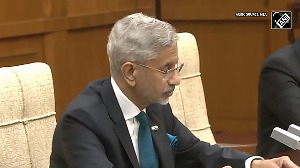Indian banks are knocking the regulator's doors, seeking approval to open branches in Dhaka, the capital of Bangladesh, as they sense an opportunity to cater to the business community involved in the trade of non-Basmati rice. Earlier this month, the government had lifted a four-year ban on the shipment of wheat and non-Basmati rice to provide a way out of the space crunch in warehouses.
Earlier this month, the government had lifted a four-year ban on the shipment of wheat and non-Basmati rice to provide a way out of the space crunch in warehouses.
The government had said it would review the decision, and that it may put a few curbs, once shipments of both the grains cross two million tonnes each.
Realising the opportunity to fund the traders in the country, Kolkata-based Allahabad Bank has sought the Reserve Bank of India's approval to open a branch in Dhaka.
"We see the lifting of the ban of non-Basmati rice as an opportunity for us to be involved in funding for trade. We have approached the regulator for opening a branch in Dhaka," said a senior Allahabad Bank official.
United Bank of India (UBI), which had
"We would conduct a survey in November to analyse the opportunities," said a senior UBI executive.
The country's largest lender, State Bank of India (SBI), has six branches in Bangladesh, spread across five cities.
SBI had recently opened branches in Khulna, Bangladesh's third-largest district and one in the north western district of Rajshahi. No other Indian bank has a significant footprint in Bangladesh.
"Since the government has allowed the export of non-Basmati rice from Bangladesh, orders worth 60,000-70,000 tonnes have been placed with exporters," said Vijay Sethia, president, All India Rice Exporters' Association, an industry body of 82 exporters and producers.
The average price of Indian non-Basmati rice export to Bangladesh is Rs 450 per tonne, Sethia said.
Bangladesh's annual demand for non-basmati rice is estimated at one million tonnes. African and West Asian countries are the other major consumers of the commodity.











